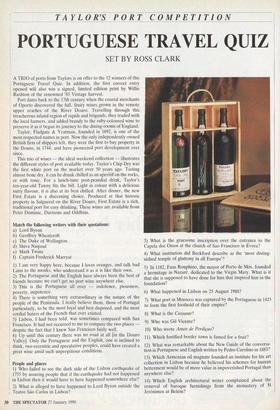TAYLOR'S PORT COMPETITION
PORTUGUESE TRAVEL QUIZ
SET BY ROSS CLARK
A TRIO of ports from Taylors is on offer to the 12 winners of this Portuguese Travel Quiz. In addition, the first correct entry opened will also win a signed, limited edition print by Willie Rushton of the renowned '85 Vintage harvest.
Port dates back to the 17th century when the coastal merchants of Oporto discovered the full, fruity wines grown in the remote upper reaches of the River Douro. Travelling through this treacherous inland region of rapids and brigands, they traded with the local farmers, and added brandy to the ruby-coloured wine to preserve it as it began its journey to the dining-rooms of England.
Tayldr, Fladgate & Yeatman, founded in 1692, is one of the most respected names in port. Now the only independently owned British firm of shippers left, they were the first to buy property in the Douro, in 1744, and have pioneered port development ever since.
This trio of wines — the ideal weekend collection — illustrates the different styles of port available today. Taylor's Chip Dry was the first white port on the market over 50 years ago. Tasting almost bone dry, it can be drunk chilled as an aperitif on the rocks, or with tonic. For a lunch-time post-prandial drink, Taylor's ten-year-old Tawny fits the bill. Light in colour with a delicious nutty flavour, it is also at its best chilled. After dinner, the new First .Estate is a discerning choice. Produced at that historic property in Salgueral on the River Douro, First Estate is a rich, traditional port for easy drinking. These wines are available from Peter Dominic, Davisons and Oddbins.
Match the following writers with their quotations: a) Lord Byron b) Geoffrey Wheatcroft c) The Duke of Wellington d) Shiva Naipaul e) Mark Twain f) Captain Frederick Marryat
1) I am very happy here, because I loves oranges, and talk bad Latin to the monks, who understand it as it is like their own.
2) The Portuguese and the English have always been the best of friends because we can't get no port wine anywhere else.
3) This is the Portuguese all over — indolence, piousness, poverty, impotence.
4) There is something very extraordinary in the nature of the people of the Peninsula. I really believe them, those of Portugal particularly, to be the most loyal and best disposed, and the most cordial haters of the French that ever existed.
5) Lisbon, I had been told, was sometimes compared with San Francisco. It had not occurred to me to compare the two places despite the fact that I knew San Francisco fairly well.
6) Up until this century there was no road at all [in the Douro Valley]. Only the Portuguese and the English, one is inclined to think, two eccentric and speculative peoples, could have created a great wine amid such unpropitious conditions.
People and places 1) Who failed to see the dark side of the Lisbon earthquake of 1755 by assuring people that if the/earthquake had not happened in Lisbon then it would have to have happened somewhere else?
2) What is alleged to have happened to Lord Byron outside the Teatro Sao Carlos in Lisbon?
3) What is the gruesome inscription over the entrance to the Capela dos Ossos at the church of Sao Francisco in 8vora?
4) What institution did Beckford describe as the most disting- uished temple of gluttony in all Europe'?
5) In 1182, Fuas Rouphino, the mayor of Porto de MOs, founded a hermitage in Nazare, dedicated to the Virgin Mary. What is it that she is supposed to have done for him that inspired him in the foundation?
6) What happened in Lisbon on 25 August 1988?
7) What port in Morocco was captured by the Portuguese in 1415 to form the first foothold of their empire?
8) What is the Cossante?
9) Who was Gil Vicente?
10) Who wrote Amor de Perdicao?
11) Which fortified border town is famed for a fruit?
12) What was remarkable about the New Guide of the conversa- tion in Portuguese and English written by Pedro Carolino in 1883?
13) Which Armenian oil magnate founded an institute for his art collection in Lisbon because he believed his schemes for human betterment would be of more value in impoverished Portugal than anywhere else?
14) Which English architectural writer complained about the removal of baroque furnishings from the monastery of St JerOnimos at Belem?


























































 Previous page
Previous page